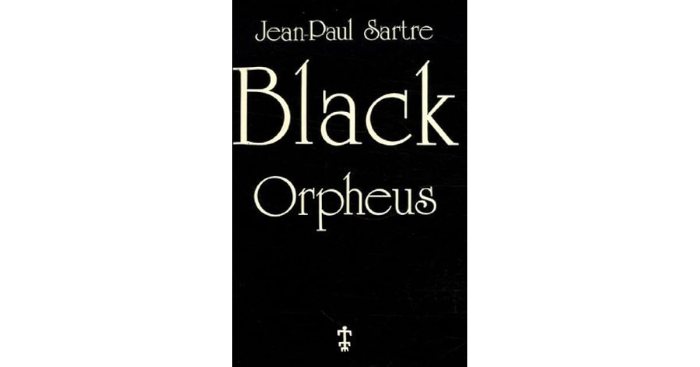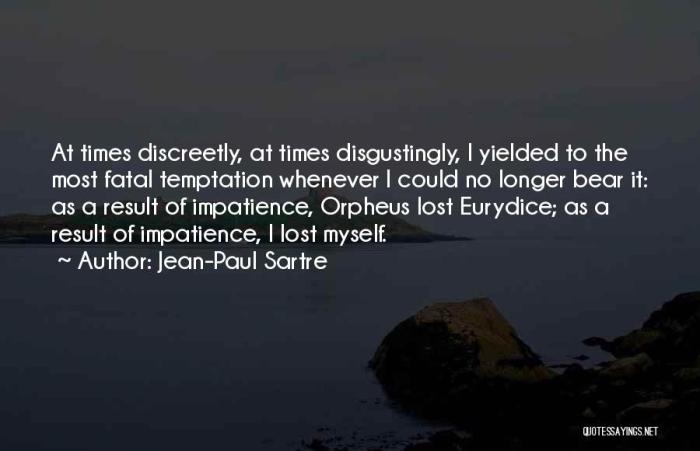Jean paul sartre black orpheus – Jean Paul Sartre’s Black Orpheus, a captivating film by Marcel Camus, intertwines existentialist philosophy with the Afro-Brazilian cultural tapestry, offering a profound exploration of love, loss, and the search for meaning.
Sartre’s existentialist tenets, emphasizing the concept of “being-in-itself” and “being-for-itself,” find resonance in the film’s narrative, which delves into the themes of human freedom, responsibility, and the complexities of human existence.
Jean-Paul Sartre’s Existentialist Philosophy

Jean-Paul Sartre, a prominent 20th-century French philosopher, is renowned for his existentialist philosophy. Existentialism emphasizes the primacy of individual existence, freedom, and responsibility over predetermined or inherent essences.
Core Tenets of Sartre’s Existentialism
- Existence precedes essence:Contrary to traditional philosophical views that define an entity by its inherent qualities, Sartre believed that existence takes precedence. An individual is not born with a predetermined nature or purpose but rather creates their own essence through their actions and choices.
- Freedom and responsibility:Sartre maintained that humans are fundamentally free and responsible for their actions. They are not bound by external forces or societal expectations but rather have the power to shape their own lives.
- Subjectivity and authenticity:Existentialism emphasizes the importance of individual experiences and perspectives. Each person’s existence is unique, and they should strive to live authentically, in accordance with their own values and beliefs.
Being-in-Itself and Being-for-Itself, Jean paul sartre black orpheus
Sartre’s existentialism revolves around two primary concepts: being-in-itself and being-for-itself.
Being-in-itselfrefers to objects or entities that exist independently of human consciousness. They are defined by their physical properties and have no inherent purpose or meaning.
Being-for-itself, on the other hand, pertains to conscious beings, particularly humans. Unlike objects, humans are not static entities but rather exist in a state of constant becoming. They are defined by their consciousness, intentionality, and ability to reflect on their own existence.
Jean-Paul Sartre’s seminal work, Black Orpheus, explores the complexities of race and identity in post-colonial Africa. His insights resonate with the diverse landscapes of Florida, where a tapestry of landforms shapes its unique character. From the rolling hills of the Panhandle to the vast wetlands of the Everglades, Florida’s landforms mirror the richness of its cultural heritage.
Black Orpheus’s themes of liberation and self-discovery find echoes in the ever-changing contours of this vibrant state, where nature’s artistry paints a vivid canvas of both struggle and triumph.
Human Freedom and Responsibility
Sartre’s existentialism places great emphasis on human freedom and responsibility. He believed that humans are not merely products of their environment or genetics but rather have the power to create their own destiny.
This freedom, however, comes with a profound responsibility. As conscious beings, humans are accountable for their actions and choices. They cannot evade responsibility by blaming external factors or societal pressures.
Black Orpheus: Jean Paul Sartre Black Orpheus

Marcel Camus’s “Black Orpheus” is a 1959 film that retells the Greek myth of Orpheus and Eurydice in a contemporary Afro-Brazilian setting during Carnival in Rio de Janeiro.The film follows Orpheus, a young musician who falls in love with Eurydice, a beautiful country girl.
However, their happiness is short-lived when Eurydice is bitten by a poisonous snake and dies. Orpheus, distraught, descends into the underworld to retrieve her.
Adaptation of the Orpheus Myth
Camus’s film retains the basic structure of the Orpheus myth while adapting it to a modern setting. Orpheus’s journey into the underworld becomes a metaphorical representation of his journey through the slums of Rio, a dangerous and violent place. The film also incorporates elements of Afro-Brazilian culture, such as the use of music and dance.
Portrayal of Afro-Brazilian Culture
“Black Orpheus” is notable for its positive and authentic portrayal of Afro-Brazilian culture. The film features a predominantly black cast and depicts the lives of ordinary Brazilians in a realistic and sympathetic way. The film’s use of music and dance also highlights the vibrancy and creativity of Afro-Brazilian culture.
Thematic Connections between Sartre and Black Orpheus

Jean-Paul Sartre’s existentialist philosophy finds resonant expression in the film “Black Orpheus.” Both the philosophy and the film explore themes of freedom, responsibility, and the search for meaning in a seemingly absurd world.
Music and Dance
In “Black Orpheus,” music and dance play a pivotal role in conveying existential themes. The vibrant rhythms and melodies of Brazilian samba represent the vitality and spontaneity of life, while the ritualistic dance sequences evoke the search for connection and transcendence.
Through music and dance, the characters express their freedom, confront their responsibilities, and grapple with the complexities of existence.
Love, Loss, and Meaning
The film’s portrayal of love, loss, and the search for meaning is deeply rooted in Sartre’s existentialist thought. The love between Orpheus and Eurydice symbolizes the human longing for connection and fulfillment, but their tragic separation highlights the fragility of existence and the inevitability of loss.
Through Orpheus’s journey to retrieve Eurydice from the underworld, the film explores the existential themes of responsibility, the absurdity of death, and the relentless search for meaning in the face of adversity.
Critical Reception and Cultural Impact

Upon its release in 1959, “Black Orpheus” garnered widespread critical acclaim and became an instant international success. Critics praised the film’s groundbreaking use of color, music, and dance, as well as its innovative blending of Afro-Brazilian folklore and Greek mythology.
The film won the prestigious Palme d’Or at the Cannes Film Festival and was nominated for an Academy Award for Best Foreign Language Film.
Influence on Subsequent Works
“Black Orpheus” has had a profound influence on subsequent works of art and popular culture. The film’s vibrant visual style and its exploration of Afro-Brazilian culture inspired countless other films, television shows, and music videos. Its use of music as a central storytelling element has also been widely imitated.
Enduring Legacy
“Black Orpheus” remains a celebrated masterpiece of world cinema. Its stunning visuals, infectious music, and timeless themes have ensured its enduring popularity. The film is widely considered to be one of the greatest films ever made and continues to be studied and admired by filmmakers and audiences alike.
Artistic Interpretation and Symbolism

Black Orpheus is a visually striking film that uses symbolism and allegory to explore themes of identity, race, and class. The film’s unique visual style and cinematography contribute to its powerful emotional impact.
Symbolism
The film’s use of symbolism is evident in the Orpheus myth, the favelas, and the Carnival. The Orpheus myth is a classic tale of love and loss, and it is used in Black Orpheus to symbolize the protagonist’s struggle for identity.
The favelas are a symbol of poverty and oppression, and they represent the challenges that the protagonist faces in his everyday life. The Carnival is a symbol of joy and celebration, and it represents the protagonist’s hope for a better future.
Visual Style and Cinematography
Black Orpheus is known for its unique visual style and cinematography. The film’s use of color and light is particularly striking, and it creates a sense of atmosphere and mood. The film’s camerawork is also innovative, and it uses a variety of techniques to create a sense of movement and energy.
Table Comparing Artistic Interpretations of Sartre and Camus
The following table compares and contrasts the artistic interpretations of Sartre and Camus:
| Sartre | Camus |
|---|---|
| Focuses on the individual’s responsibility for their own existence | Focuses on the absurdity of life and the need for individual rebellion |
| Believes that humans are free to create their own meaning in life | Believes that humans are ultimately doomed to meaninglessness |
| Uses existentialist themes in his work, such as freedom, responsibility, and authenticity | Uses absurdist themes in his work, such as the meaninglessness of life, the futility of hope, and the inevitability of death |
Comparative Analysis with Other Works
Black Orpheus shares existentialist themes with various films and literary works, exploring the complexities of human existence and the search for meaning in an indifferent universe.
Similarities in Existentialist Approaches
Similarities include the exploration of:
- Individual Freedom and Responsibility:Characters grapple with the burden of choice and the consequences of their actions.
- Meaninglessness and Absurdity:The world is often portrayed as indifferent or meaningless, challenging characters to find purpose.
- Alienation and Isolation:Characters experience a sense of isolation and disconnection from others and society.
Differences in Existentialist Approaches
Despite these similarities, differences exist in how these works approach existentialism:
- Optimism vs. Pessimism:Black Orpheus offers a more optimistic outlook, suggesting the possibility of redemption and transcendence. Other works, like Camus’ “The Stranger,” present a more pessimistic view of human existence.
- Cultural Context:Black Orpheus’s setting in Rio de Janeiro’s vibrant carnival culture influences its exploration of existential themes, while other works may draw on different cultural contexts.
- Narrative Style:Black Orpheus uses a surreal and symbolic narrative style, while other works may employ more straightforward or realistic approaches.
Key Themes Emerging Across Works
Key themes emerging across these works include:
- The search for meaning in a meaningless world
- The tension between individual freedom and social expectations
- The importance of authenticity and personal growth
Common Queries
What is the central theme of Black Orpheus?
The film explores the existential themes of love, loss, and the search for meaning, examining the human condition through the lens of Afro-Brazilian culture.
How does Black Orpheus reflect Sartre’s existentialist philosophy?
The film’s portrayal of human freedom, responsibility, and the search for meaning aligns with Sartre’s existentialist tenets, particularly the concepts of “being-in-itself” and “being-for-itself.”